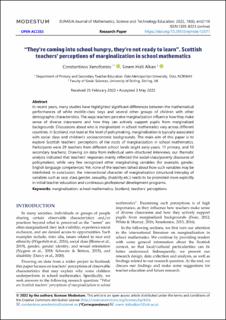| dc.contributor.author | Xenofontos, Constantinos | |
| dc.contributor.author | Hizli Alkan, Sinem | |
| dc.coverage.spatial | Scotland | en_US |
| dc.date.accessioned | 2022-09-30T12:18:42Z | |
| dc.date.available | 2022-09-30T12:18:42Z | |
| dc.date.created | 2022-05-08T03:42:43Z | |
| dc.date.issued | 2022-05-07 | |
| dc.identifier.issn | 1305-8215 | |
| dc.identifier.uri | https://hdl.handle.net/11250/3022924 | |
| dc.description.abstract | In recent years, many studies have highlighted significant differences between the mathematical performances of white middle-class boys and several other groups of children with other demographic characteristics. The ways teachers perceive marginalization influence how they make sense of diverse classrooms and how they can actively support pupils from marginalized backgrounds. Discussions about who is marginalized in school mathematics vary across different countries. In Scotland, not least at the level of policymaking, marginalization is typically associated with social class and children’s socioeconomic backgrounds. The main aim of this paper is to explore Scottish teachers’ perceptions of the roots of marginalization in school mathematics. Participants were 29 teachers from different school levels (eight early-years, 11 primary, and 10 secondary teachers). Drawing on data from individual semi-structured interviews, our thematic analysis indicated that teachers’ responses mainly reflected the social-class/poverty discourse of policymakers, while very few recognized other marginalizing variables (for example, gender, English language competence). Yet, none of the teachers talked about how such variables may be interlinked. In conclusion, the intersectional character of marginalization (structural interplay of variables such as race, class gender, sexuality, disability etc.) needs to be promoted more explicitly in initial teacher education and continuous professional development programs. | en_US |
| dc.description.sponsorship | This paper reports on data from a project funded by The Carnegie Trust for the Universities of Scotland (RIG008710). | en_US |
| dc.language.iso | eng | en_US |
| dc.publisher | Modestum | en_US |
| dc.relation.ispartofseries | EURASIA Journal of Mathematics, Science and Technology Education;Volume 18 Issue 6, Article No: em2116 | |
| dc.rights | Navngivelse 4.0 Internasjonal | * |
| dc.rights.uri | http://creativecommons.org/licenses/by/4.0/deed.no | * |
| dc.subject | Marginalization | en_US |
| dc.subject | School mathematics | en_US |
| dc.subject | Scotland | en_US |
| dc.subject | Teachers’ perceptions | en_US |
| dc.title | “They’re coming into school hungry, they’re not ready to learn”. Scottish teachers’ perceptions of marginalization in school mathematics | en_US |
| dc.type | Peer reviewed | en_US |
| dc.type | Journal article | en_US |
| dc.description.version | publishedVersion | en_US |
| dc.rights.holder | © 2022 by the authors | en_US |
| dc.source.articlenumber | em2116 | en_US |
| cristin.ispublished | true | |
| cristin.fulltext | original | |
| cristin.qualitycode | 1 | |
| dc.identifier.doi | https://doi.org/10.29333/ejmste/12071 | |
| dc.identifier.cristin | 2022391 | |
| dc.source.journal | EURASIA Journal of Mathematics, Science and Technology Education | en_US |
| dc.source.volume | 18 | en_US |
| dc.source.issue | 6 | en_US |
| dc.source.pagenumber | 1-9 | en_US |
| dc.relation.project | Carnegie Trust: RIG008710 | en_US |

